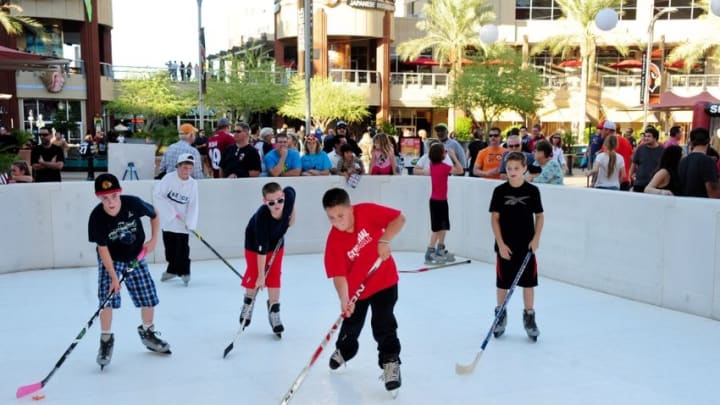Coyotes: The Growth of Hockey in Arizona

The emergence of hockey in the state of Arizona has been very fun to watch over the past decade.
“Look around, we know what you see, a band of outsiders, different, apart from the rest. You don’t get our clothes or the way we act, let me tell you what you don’t see…..At 95 degrees there is zero room for fair weather fans, we represent an entire state, a state of heart. We summon WhiteOuts in the Valley of the Sun, and this isn’t a logo, it’s a badge of honor. Because we weren’t born into this, we chose this, and that’s what makes us stronger……We’re a bunch of young guns and starworts that play fast and loud. We come from the East, the North, and the far Northeast. We might be surrounded by desert but our blood runs ice-cold; we don’t shoot pucks, we bury them. Back us into a corner, and we’ll have you right where we want you, because this, my friend this isn’t an arena, it’s an attack zone, but together we prey…….So if you’re looking for your dad’s original six, look somewhere else, that’s not who we are, never will be. We’re a new breed, what makes us different unties us. We are A Pack Apart, We are Coyotes!” — Arizona Coyotes, 2015
I get it, we live in a desert, we walk into an arena, chilled to 42 degrees, a couple of times a week to watch grown men skate on ice. It may not make sense to many, but for thousands of Arizonans it is a way of life. No matter if you are a fan of the Coyotes or just the NHL, exposed to the game through the Arizona State Sun Devils or the former Phoenix Roadrunners, or you are playing or have played the game, hockey is thriving in Arizona.
The last full season without a professional hockey team was 1995; around 2,000 youth hockey players were spread across three rinks statewide. Now 20 years after the Arizona Coyotes came to the desert the number of kids playing hockey in Arizona have jump to 7,200 in 2016, and the team has officially signed partnerships with every Phoenix area rink under the “Part of the Pack” rink partnership program.
Many will say that in 20 years the state has grown, which is true, but the growth of the sport is mostly connected to the success of the Arizona Coyotes. When the Coyotes went through bankruptcy and ownership issues in the early 2000s, the numbers in youth hockey plummeted from around 6,000 to around 4,500 from 2002 to 2012.
When Anthony LebBlanc, George Gosbee, and the rest of the Ice Arizona ownership group bought the team in 2012 the youth hockey numbers skyrocketed. Just last season the number of youth hockey participants jumped from 5,200 to 7,200, with 1,307 kids signed up for the Little Howlers Learn to Play program. As a native Arizonan I see the growth first hand. Instead of kids playing baseball in the street, they are picking up hockey sticks and using whatever ball is available to play hockey.
The Arizona Coyotes host hockey clinics and began their Coyotes Mobile Tour in 2016. The team is in the process of building ball hockey rinks, working with local parks and recreation departments to create these rinks. The goal of establishing these rinks is to allow kids to play hockey without having to learn to skate, all they have to do is be able to run. Since 2012 the Arizona Coyotes Hockey Development team has visited over 200 schools all over the state to show kids the game of hockey. In the four years of the program over 120,000 kids have been exposed to hockey.
They are committed to growing the game of hockey in Arizona, and you don’t have to look any further than the NHL Draft in June, where Arizona native Auston Matthews is likely the number one selection. Matthews was born in California, but moved to Arizona as an infant. He found his love of hockey through the Phoenix Coyotes, when he began to attend games at just two years old. Matthews’ favorite players are Shane Doan and Daniel Brière. He began playing for the Arizona Bobcats, a Coyotes’ partnered team, when he was six. Auston is the future of the NHL, and his passion for the game all stems from the Coyotes being in Arizona.
You could also point to the Coyotes as the driving force behind the recent elevation of the Arizona State Sun Devil Hockey team to Division 1 status. The Sun Devils competed last season with a hybrid schedule, playing both NCAA and Club teams. In the 2016-2017 season ASU will have a full NCAA schedule, including home games against hockey powerhouses like Michigan, Brown, and Harvard. The Coyotes partnered with the Sun Devils, who played several games at Gila River Arena, and Tempe is one of the locations the team is looking at for a permanent home.
I think one of the most exciting things about the growth of the sport in Arizona is the very recent development of the Coyotes American Hockey League affiliate. The Coyotes announced in May that the AHL affiliate, formerly in Massachusetts, would move to Tucson. The AHL team is currently not named, but will begin playing in the Tucson Convention Center for this upcoming season.
Next: Diamondbacks Look for 3rd Straight Series Win
I know that summers maybe hot, but hockey is not a sport that is going away in Arizona. As the Coyotes celebrate 20 years in the Valley of the Sun this season, the youth in Arizona are continuing to flock towards the sport of hockey; it’s here to stay.